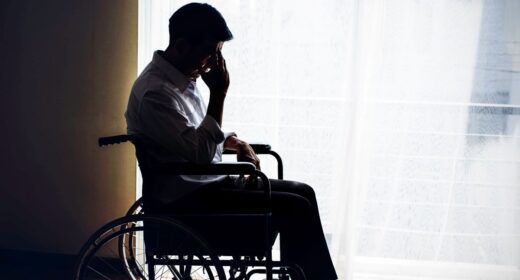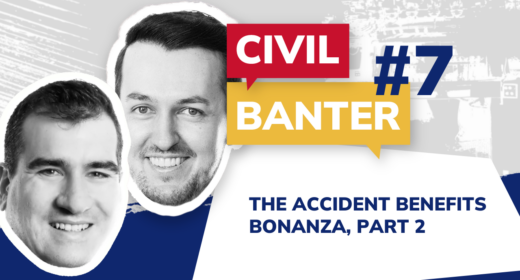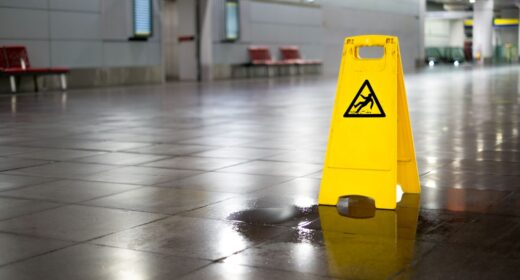Below are a few tips on how you can protect your own and others’ physical health as well as some important information on what happens if you fall on someone else’s property or if someone falls on yours.
A version of this article originally appeared in the April 2019 edition of Fifty Five Plus Magazine.
Tips to prevent slip and falls this winter
Wear gloves. On chilly days, people tend to walk with their hands in their pockets. Unfortunately, this means that your hands are unavailable to either steady yourself or hold onto railings or other supports to prevent a fall. In the event you do fall, you will not be able to brace yourself.
Have a maintenance plan for your driveway and walkway. You have a legal duty to maintain your property, and doing so will help protect you, those close to you, and others who may attend your property, including delivery persons or neighbours. If you cannot shovel your own driveway, look into snow removal services or other resources in your community. Regularly salting or using other methods to increase grip on your driveway and walkway is similarly important. Many municipalities also have bylaws requiring you to remove snow and ice adjacent to your property. If there is a sidewalk along your property, this bylaw may apply to you. If you fail to act in accordance with your local bylaw, your municipality may issue a notice to comply on you, or even impose financial penalties.
Be careful getting out of your car. Slippery conditions are sometimes difficult to notice, and the transition from car to ground is a common way to slip. Take your time, especially if you are also carrying groceries or other items.
Wear appropriate footwear. Depending on your lifestyle, consider purchasing ice grips for the winter months. Ice grips, which slide over most boots, are highly effective in slippery conditions. They are especially great if you are outside for longer periods of time. For example, they are very useful for walking your dog or for going on a winter hike.

Stay on plowed or salted pathways as much as possible. If you are in a rush, it can be tempting to take shortcuts across unplowed or unsafe areas. For instance, if someone in front of you is walking slowly, you might attempt to pass them by walking along the edge of the sidewalk. These types of shortcuts are rarely worth the increased chance of falling and hurting yourself. The path most travelled is often the safest one.
Take extra time. If you know weather or road conditions are going to be difficult, you need to account for extra time. If you are in a rush, you will be more likely to forego precautionary measures.
Finally, pay attention. In today’s hyperconnected world, people are more likely to be distracted by devices. Watch where you are walking and try to anticipate icy patches, busy areas, or others who may be being less careful. Walking in bad conditions has many of the same risks as driving in bad conditions — not only do you have to pay attention to your own safety, but you need to be aware of how others’ mishaps could subsequently put your own safety at risk.
What happens if you fall?
In the unfortunate event that you do slip and fall, from a legal perspective, there a few things you should know. If you followed the above tips, depending on where you fell, then you may have already protected your legal interests. This is because, by taking reasonable precautions and measures, you attempted to avoid the fall. This can have an important effect on your potential claim.
In a slip and fall personal injury claim, an injured party may have their damages award reduced, based on the principle of “contributory negligence” if they are found to be partly responsible for the accident. Contributory negligence is assigned on a percentage basis. For example, if you are found to be 25 per cent responsible for the fall, then your damages award will be reduced by 25 per cent. If, however, you have taken the precautionary measures, as listed above, a court may find that you acted reasonably, and therefore did not contribute to your fall. Therefore, you may receive the full damage award for your injuries.
It is also important to remember that even if you think you might be partly responsible for the fall, this does not prevent you from starting a lawsuit. Speak with a lawyer, as they will be able to better guide you through your potential claim.
But do not delay finding out more about your potential claim because a limitation period will apply. A limitation period is a legal time limit dictating how long you have to bring a claim against someone. For most personal injury claims, including slip and falls, the limitation period is two years. This means that you generally have two years from the time of the incident to bring your claim. However, if you slip and fall on municipal property, a shorter delay applies. Specifically, you must notify the municipality within 10 days of the accident. Failure to do so may prevent you from being able to sue. The basis of this rule is that prompt notification to the municipality is required so they can prevent the hazard from endangering others. If you do not know whether you or a loved one slipped on municipality property or not, it is better to err on the side of caution and contact a personal injury lawyer as soon as possible. Personal injury lawyers will be aware of the urgency of notifying the municipality and can take steps to protect your claim.
What if someone else falls on my property?
If someone slips and falls on your property and sustains serious injuries, you may be legally responsible under the Occupier’s Liability Act for their losses. Under this Act you have a duty of care to ensure that people who enter your property are reasonably safe. This does not mean you have to do everything possible to ensure others’ safety, however, you must take all reasonable measures under the circumstances. Note that if someone slips on a municipally owned sidewalk adjacent to your house, the municipality (not you), is legally responsible. At worst, you could be fined for failing to comply with your local bylaws.
While some of the tips listed above can be tedious, they will reduce your liability if you or someone else slips and falls. More importantly, they will keep you and those around you safe. Taking precautions to prevent slip and falls from occurring is always the best option. By making safe practices a part of your daily routine, especially in winter, you can prevent slip and falls.
Nelligan Law gratefully acknowledges the contribution of Adrienne Fanjoy in preparing this article.



